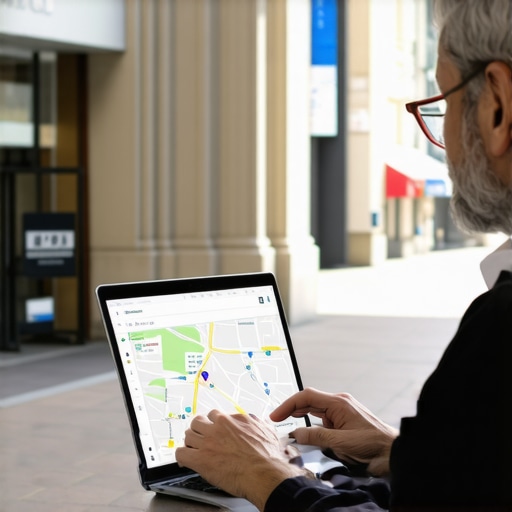My Unexpected Discovery: Why Google Maps Ranks Matter More Than Ever
As someone who runs a local business, I always knew the importance of visibility, but I didn’t realize how crucial Google Maps rankings were until I faced stiff competition. I remember the day I stumbled upon a comprehensive guide on GMB help secrets for navigating the algorithm. That was a turning point in my journey to dominate local search results.
My Personal Strategy: How I Leveraged SEO Support for Google Maps Success
Implementing effective Google Maps SEO strategies changed everything. I focused on optimizing my GMB profile, ensuring consistency in NAP (name, address, phone number), and actively engaging with customers through reviews and posts. I also utilized profile optimization techniques that helped boost my visibility in local searches. These steps were backed by insights from authoritative sources, such as Moz’s local SEO guide, which emphasizes the importance of local relevance and engagement.
What Are the Key Factors That Help Your GMB Rank Higher?
From my experience, several factors play a vital role in Google Maps ranking. These include accurate business information, regular updates, and positive reviews. I also learned that strategic keyword usage and photo updates can significantly influence your ranking. For instance, I started posting high-quality images of my products, which increased customer engagement and improved my local search standing.
How Do I Keep Up With Constant Algorithm Changes?
This is the question that kept me on my toes. Google’s algorithm is constantly evolving, making it essential to stay informed. I subscribe to industry blogs and follow updates from Google’s official Google My Business support. Moreover, I learned that working with experienced local SEO experts can provide insights and tactics that keep you ahead of the competition.
Is It Worth Investing in Professional SEO Support for Google Maps?
Absolutely! Based on my experience, professional support accelerates results and provides tailored strategies that are difficult to implement alone. If you’re serious about climbing the ranks, I recommend exploring advanced GMB support tactics and considering expert consultation.
If you’ve tried everything and still struggle with rankings, I invite you to share your experiences or ask questions below. Remember, consistent effort and strategic support are key to mastering Google Maps SEO!
How Can Deep Data Analysis Revolutionize Your Google Maps SEO?
In my journey to master local search rankings, I discovered that leveraging detailed analytics from tools like Google My Business Insights can provide a competitive edge. By meticulously analyzing customer interactions, search queries, and engagement patterns, I identified key opportunities for optimization. For example, pinpointing popular service keywords and understanding peak engagement times allowed me to tailor my posts and updates effectively. This nuanced approach aligns with insights from reputable sources such as your guide to Google Maps visibility, emphasizing data-driven decisions for sustained ranking improvements.
What Role Do External Signals Play in Local SEO Authority?
Beyond your GMB profile, external signals like local backlinks, citations, and social media mentions significantly influence your local SEO authority. I found that cultivating relationships with local bloggers and industry influencers can generate valuable backlinks and mentions, boosting your profile’s credibility in Google’s eyes. For instance, participating in community events and obtaining coverage can lead to high-quality citations that reinforce your local relevance. According to Moz’s authoritative guide on local SEO, these external signals are crucial in establishing your business as a trusted entity within your community, thereby enhancing your Google Maps ranking.
Can Customer Engagement Metrics Be Your Secret Weapon?
Absolutely. Customer engagement — especially reviews and Q&A interactions — directly impact your visibility. Encouraging satisfied customers to leave detailed reviews and responding promptly to inquiries can improve your profile’s activity signals. For example, I implemented a follow-up email strategy asking customers for reviews post-service, which resulted in a steady increase in positive feedback. This active engagement signals to Google that your business is popular and trustworthy, reinforcing your position in local search results. For more advanced tactics, exploring expert GMB help and SEO support can further refine your approach.
Is It Time to Outsource Your Local SEO Efforts to Experts?
Considering the complexities and constant algorithm updates, outsourcing to experienced local SEO professionals can be a game-changer. They bring a strategic perspective, access to advanced tools, and ongoing support that can accelerate your rankings. For instance, working with experts allows you to implement advanced GMB support tactics that are often inaccessible or time-consuming to develop on your own. If you’re serious about dominating your local market, investing in professional assistance might be the most effective move.
Would you like to explore more about sophisticated local SEO tactics? Drop a comment below, share your experiences, or check out additional resources like boosting your Google Maps rankings with expert support. Staying ahead requires continuous learning and strategic action!
My Journey Into the Nuances of Google Maps Algorithm Dynamics
Over time, I’ve come to realize that Google Maps’ ranking system isn’t just about surface-level optimizations. It’s a complex ecosystem influenced by local relevance signals, user engagement metrics, and even subtle external factors like backlinks from local directories and community mentions. I recall a time when a minor tweak in my review response strategy led to a noticeable boost in rankings, highlighting how intertwined these signals are. This depth of understanding compelled me to dig deeper into innovative SEO techniques that go beyond standard practices.
The Hidden Power of Data-Driven Optimization in My Strategy
One breakthrough for me was leveraging Google My Business Insights not just for surface stats but for actionable data. By analyzing search queries that led customers to my listing, I uncovered niche keywords and service phrases that weren’t initially on my radar. This granular data allowed me to craft targeted content and posts, aligning with effective Google Maps SEO strategies. It became clear that continuous refinement based on real user behavior is vital for staying ahead in competitive local markets.
How External Influences Mold Your Local SEO Authority
External signals like backlinks from reputable local sites, citations, and social media buzz have a profound impact, often underestimated by newcomers. I found that establishing genuine relationships with community influencers and engaging in local sponsorships created valuable backlinks. These external signals enhance your profile’s authority in Google’s eyes, making your rankings more resilient to algorithm shifts. According to Moz’s latest insights on local SEO, these external factors are not just supplementary but integral to a holistic optimization approach.
Delving Into Customer Engagement: The Real Differentiator
While reviews are often discussed, I’ve learned that the quality of engagement matters even more. Detailed, positive reviews paired with prompt, personalized responses build trust and boost user activity signals. I implemented a follow-up system that encouraged satisfied clients to share their experiences, which not only increased review volume but also improved the overall sentiment. This active dialogue positions your business as customer-centric, a factor that Google increasingly prioritizes. For those eager to elevate their profile further, expert GMB support can provide tailored tactics to amplify these efforts.
What are the most subtle yet impactful signals that influence Google Maps rankings in competitive markets?
In my experience, niche relevance, customer engagement quality, and external local signals collectively shape rankings. For instance, strategically using long-tail keywords in posts and reviews can create a nuanced relevance that Google recognizes. Moreover, optimizing for user intent—such as FAQs and service-specific queries—can create a richer user experience and signal higher relevance. Staying attuned to these subtle cues requires ongoing monitoring, which I achieve through advanced analytics tools and constant learning from authoritative sources like top SEO tactics. This proactive approach ensures that I adapt quickly to algorithm updates and maintain a competitive edge.
If you’re passionate about mastering local SEO and want to share your insights or challenges, I encourage you to comment below. Exploring these advanced strategies together can unlock new levels of success.
Harnessing the Power of Local Authority Signals for Long-Term Dominance
Beyond the traditional metrics like reviews and citations, cultivating local authority through strategic partnerships and content collaborations has emerged as a game-changer. Establishing relationships with respected local entities—such as chambers of commerce or community boards—not only garners high-quality backlinks but also enhances your business’s credibility in Google’s eyes. I’ve seen firsthand how such external signals, when consistently nurtured, create a resilient ranking foundation that withstands algorithm fluctuations. An insightful resource that I often reference is Moz’s detailed analysis on local SEO authority. This approach ensures sustained visibility and positions your business as a trusted local leader.
Deciphering the Subtleties of User Interaction Metrics
While reviews and Q&A are well-known factors, the quality and depth of customer interactions hold even greater significance. Engaging customers with personalized follow-ups, proactive responses, and tailored content not only boosts engagement metrics but also signals a high level of service quality to Google. For example, I implemented a system where clients received customized thank-you messages post-interaction, which encouraged more detailed reviews and ongoing engagement. These nuanced signals contribute to a vibrant activity footprint, reinforcing your local relevance. To delve deeper into optimizing these engagement signals, consider exploring advanced SEO techniques for Google Maps. Continuous refinement in this area is vital for staying ahead in competitive markets.

Leveraging Data Analytics for Precision Optimization
Advanced analytics tools, such as Google My Business Insights combined with third-party data platforms, enable granular analysis of customer behavior and search intent. I utilize these insights to identify underserved keywords and emerging local trends, tailoring my content and service offerings accordingly. A notable example involved analyzing search queries revealing niche service demands, which I then incorporated into my profile updates and posts, resulting in measurable ranking improvements. This data-driven approach aligns with the principles outlined in an authoritative guide to local SEO success. Embracing this methodology ensures continuous growth and adaptability amidst evolving Google algorithms.
Engaging with Community-Driven Content for Authority Building
Community engagement through local content initiatives—such as sponsorships, event participation, and local news features—can significantly amplify your visibility. These activities generate authentic backlinks, social mentions, and user-generated content, all of which contribute positively to your local SEO profile. I found that hosting free workshops or participating in charity events often leads to organic coverage and backlinks from reputable local outlets. According to Moz’s expert insights, these external signals are crucial for establishing your authority and resilience in the face of algorithm updates. Consistently integrating community-driven efforts creates a sustainable pathway to long-term rankings.
Ready to Elevate Your Local SEO Strategy?
If you’re committed to surpassing your competitors, I encourage you to explore these advanced tactics and consider partnering with seasoned local SEO professionals. They bring the expertise and tools necessary for nuanced optimization, ensuring your business remains at the forefront of local search results. For tailored support, check out advanced GMB support strategies. Share your experiences or questions below—your journey to Google Maps supremacy can benefit from collaborative insights and innovative approaches. Remember, the path to top rankings is an ongoing process of strategic refinement and community engagement, backed by data and external signals.
Things I Wish I Knew Earlier (or You Might Find Surprising)
Revealing the Power of Local Engagement
One surprising insight I discovered was how powerful genuine local engagement can be. When I started actively participating in community events and collaborating with nearby businesses, my Google Maps ranking improved more than I expected. It’s not just about technical tweaks; building real relationships creates external signals that Google values highly.
The Hidden Impact of Consistent NAP Data
I used to think that updating my business info once was enough. Turns out, maintaining consistency in your NAP (name, address, phone number) across all platforms is a game-changer. Small discrepancies can hurt your rankings, so I now double-check every detail regularly.
Understanding the Algorithm’s Subtle Cues
What really blew my mind was how subtle signals, like the timing of reviews or photo updates, can influence rankings. It’s like the algorithm is reading between the lines, rewarding active profiles that show ongoing activity and relevance.
The Role of External Citations and Backlinks
External signals from local directories, backlinks, and mentions boost your authority. I found that nurturing relationships with local influencers and community sites can generate powerful citations that strengthen my profile’s trustworthiness in Google’s eyes.
Why Customer Interaction Quality Matters More Than Quantity
Getting reviews is important, but engaging meaningfully with customers through responses and Q&A shows Google your business is active and trusted. I started replying to every review personally, which noticeably improved my visibility and customer trust.
Resources I’ve Come to Trust Over Time
- Moz’s Local SEO Guide: This comprehensive resource helped me understand the importance of local relevance and external signals. It’s a must-read for anyone serious about Google Maps SEO.
- Google My Business Official Blog: Staying updated with Google’s official updates ensures I’m not caught off guard by changes in the algorithm. It’s a reliable source for the latest best practices.
- Neil Patel’s Digital Marketing Blog: Neil’s insights on local SEO and content strategies have been invaluable. I often recommend his articles for practical tips and deep dives into SEO tactics.
Parting Thoughts from My Perspective
Mastering Google Maps SEO isn’t just about quick fixes; it’s about understanding the nuanced signals that influence your rank and consistently nurturing your presence. Combining technical optimization with authentic community engagement and external signals creates a resilient strategy that can withstand algorithm shifts. If you’re serious about climbing the local search ladder, don’t forget to leverage data insights and consider working with experts who understand these subtle dynamics. Remember, your journey to better Google Maps rankings is ongoing—stay curious, stay active, and keep refining your approach. If this resonated with you, I’d love to hear your thoughts or your own experiences. Sharing knowledge helps us all succeed in this ever-evolving landscape.


Really enjoyed this deep dive into Google Maps SEO! The emphasis on data analytics resonates with my experience—I’ve seen quite a difference in rankings after I started analyzing search queries and customer engagement patterns more meticulously. What I find challenging, though, is maintaining the consistency of NAP data across such a wide array of platforms, especially for a growing business. Have others found any tools or methods that help automate or streamline this process?
The point about external signals like backlinks and community involvement highlights how important genuine connections are. I’ve been thinking about increasing our local collaborations, but I wonder—what are some effective ways to build authentic relationships without it feeling forced or transactional? Would love to hear others’ strategies.
Lastly, the idea of continuous refinement and learning is so crucial. I’ve found that keeping up with industry blogs like Moz and Neil Patel’s content helps me stay on top of best practices. How do you all keep your skills sharp while managing day-to-day operations? Would be great to exchange tips!
This post really hits home about the importance of dynamic data analysis and external signals for local SEO success. I’ve personally found that regularly updating citations and backlinks from local partners vastly improves rankings over time. It’s interesting how even small community involvement, like sponsoring a local event or collaboration, can play a big role in building authority and trust with Google.
Regarding NAP consistency, I’ve been using a tool called BrightLocal, which helps automate citation management and monitors discrepancies across platforms. It might be worth checking out if maintaining NAP accuracy is a challenge. As for external signals, do you think focus should be more on quality or quantity of backlinks? I’d love to hear others’ approaches.
Finally, engaging with customers through personalized responses and ongoing Q&A has greatly improved my profile activity. Do you think Google’s algorithm is prioritizing quality engagement more than ever? It’s fascinating how nuanced these signals are becoming. Would love to exchange strategies for keeping up with these ever-evolving ranking factors!
This is a fantastic overview of the nuances behind Google Maps rankings. I agree that data analytics and external signals like backlinks and local citations play a pivotal role. I’ve actually noticed that engaging with local community groups and participating in neighborhood events not only boosts external signals but also fosters authentic relationships that Google tends to reward. Regarding NAP consistency, I’ve been testing various tools like Whitespark and Synup to automate updates across multiple directories, which has been a huge time-saver for me. I’m curious—do others think that focusing on high-quality backlinks from relevant local sites outweighs simply increasing their number? I’ve found that a few well-placed, relevant links seem to make more impact than numerous low-quality ones. It’s fascinating how Google’s algorithm appears to prioritize quality over quantity increasingly. How are you all balancing these different tactics without spreading yourselves too thin? Would love to hear experiences on maintaining strategic focus while managing growth.